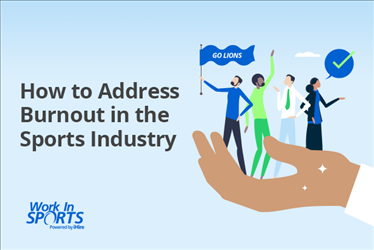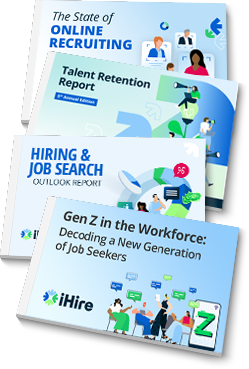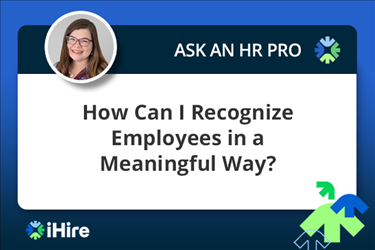- Employer Resources
- |
- Last Updated: February 07, 2023

How to Address Burnout in the Sports Industry
Working in the sports industry comes with a lot of perks, such as getting a front-row seat to exciting events, forming relationships with driven professionals in the industry, and working in a fast-paced environment with each day presenting exciting new challenges. However, a sustained career in sports requires hours above and beyond that of most professions since most sporting events happen on nights and weekends. Burnout in the sports industry has always been a problem, but it became more noticeable in 2020 when the COVID-19 pandemic suddenly canceled events for the year and organizations reduced staff in response, putting further strain on the remaining employees.
According to the State of Sports Hiring Report, 64.6% of respondents were employed but actively or passively seeking a new job in 2022 (up from 51.8% in 2021). Even more discouraging, 32.8% of the respondents searching for a new job were looking to change careers and leave the sports industry entirely. Staff turnover is a larger problem in sports than other industries. Take college athletics, for example, whose 2020–22 turnover rate was 48%, nearly double the level of most corporations or higher education institutions.
With sports organizations always in need of quality workers, here's how to avoid burning out your employees and losing valuable staff:
Allow Flexible Hours
Due to the high volume of events the typical sports employee works, the hours required to excel in the field aren't likely to go down. However, sports employers can positively impact their employees and allow them to perform at their best by changing how they work. For example, a study on college athletics employees revealed that incorporating alternative work arrangements, such as work-from-home opportunities and flexible hours, significantly reduced the amount of work-family conflict (a primary driver of burnout and turnover) experienced by employees. In addition, policies allowing for workplace flexibility would also considerably benefit women, who are more likely to report burnout within the sports industry.
Make Salary a Priority
While money alone won't avoid burning out employees, pay is a significant stressor in the sports industry. In the State of Sports Hiring Report, 21.5% of sports employees looking for a new job are doing so because they are unsatisfied with their pay. Additionally, 61.7% of employers expect a talent shortage or lack of qualified candidates to impact their hiring efforts. Therefore, allocating budget to improving salaries can be the difference between keeping valuable employees and a lengthy hiring process.
Be Realistic With Your Demands
Sports employees are used to wearing a lot of hats as they attempt to advance their careers, particularly in minor league sports and college athletic departments outside of the Power-5 conferences. Due to the competitive nature of sports, smaller staffs get stretched thin trying to do the work of departments with three-to-five times more people.
Those expectations to "do more with less" are affecting the employment landscape as 43% of job seekers who responded to the State of Sports Hiring Report survey believe employers' unrealistic or overly specific requirements for candidates will impact their job search efforts. Instead of trying to do everything with limited resources, focusing on what you can do well as a department can improve the culture of your office and help retain engaged workers. Additionally, outsourcing some responsibilities to contractors with a specific focus could also alleviate some of the burdens on your full-time staff.
Create Your Account Today

Allow Workers to Take Time Off as Needed
There is an unspoken expectation that taking time off is only for the offseason. The same study on college athletics employees noted a “cultural pressure to not request time off while in-season, and insistence from supervisors to prioritize career over family” that creates “a ripe environment to allow engagement to become workaholism.” This also fits with some of my own experience over 12 years in athletics, having gotten sideways glances at requesting an event off to attend a friend’s wedding at one stop while experiencing a more accepting environment when the same situation happened with a different employer because they had staffing strategies in place to cover absences.
It is understandable that managers expect (and should get) coverage of all athletic events; however, creating a culture where employees are comfortable taking time off because the organization can pick up the slack in their absence will go a long way to avoid burning out employees.
Limit After-Hours Work Communication
Given the amount of hours athletic employees put into their job, it’s easy for the lines between work and home to get a little blurry. Regardless, creating boundaries between your employees’ office and personal lives is important. Everyone needs time to decompress from their job, and expecting your employees to be “always on” is a fast way to burning them out. Set clear expectations for responding to work-related communications and when staff should be available, and ensure your managers are modeling this behavior from the top (e.g., not texting employees late at night if a request can wait until business hours the next day).
The state of employment in the sports industry has changed, and those changes appear to be long lasting. Employees are demanding a course correction in their working conditions to an environment that includes better work-life balance and recovery time from busy schedules. The sports employers that adjust to accommodate this are the ones that will position themselves and their workers for success.
Check out our resource center to learn more about creating a mutually beneficial work environment for your employees.

Originally Published: February 07, 2023
RELATED RESOURCES
Hiring? You're in the Right Place.
- Reach unique talent: 51% of our candidates aren't using other job boards
- Connect your ATS and get 6x more applications with iHire's apply process
- Get matching candidate resumes sent straight to your inbox
We Value Your Privacy




